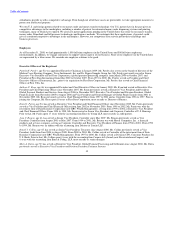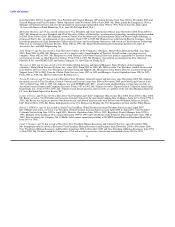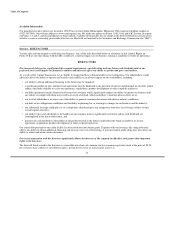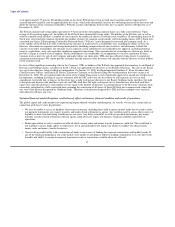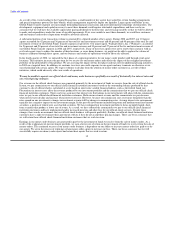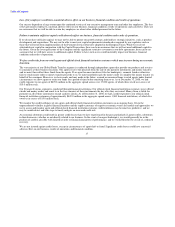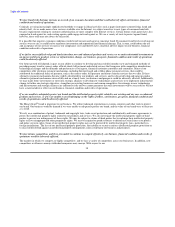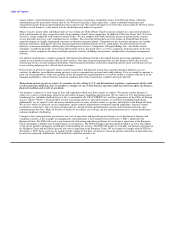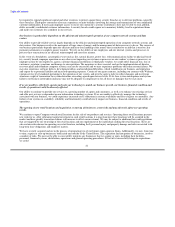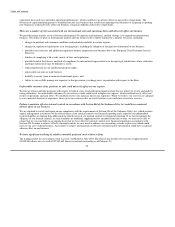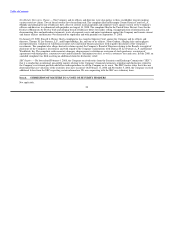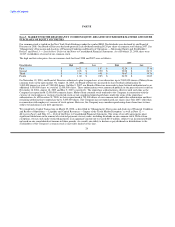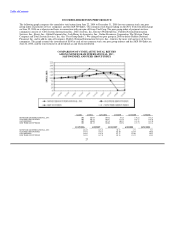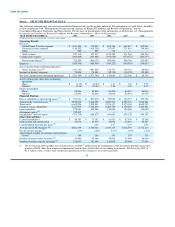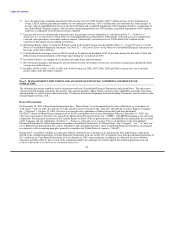MoneyGram 2008 Annual Report Download - page 22
Download and view the complete annual report
Please find page 22 of the 2008 MoneyGram annual report below. You can navigate through the pages in the report by either clicking on the pages listed below, or by using the keyword search tool below to find specific information within the annual report.
Table of Contents
money transfer, urgent bill payment and money order businesses, our primary competition comes from Western Union, which has
substantially greater transaction volume than we do. Western Union has a larger agent base, a more established brand name and
substantially greater financial and marketing resources than we do. We cannot anticipate every effect that actions taken by Western Union
will have on our business, or the money transfer and bill payment industry in general.
Money transfer, money order and bill payment services within our Global Funds Transfer segment compete in a concentrated industry,
with a small number of large competitors and a large number of small, niche competitors. In addition to Western Union, the U.S. Postal
Service is a large competitor with respect to money orders. We also compete with banks and niche person-to-person money transfer
service providers that serve select send and receive corridors. The electronic bill payment services within our Global Funds Transfer
segment compete in a highly fragmented consumer-to-business payment industry. Competitors in the electronic payments area include
financial institutions, third parties that host financial institution and bill payment services, third parties that offer payment services
directly to consumers and billers offering their own bill payment services. Competitors of PropertyBridge, Inc., our wholly owned
subsidiary, include the providers of electronic bill payment services discussed above, as well as companies focusing solely on the rent
payment vertical, companies focusing on multiple payment verticals, including rent payments, and providers of property management
software.
Our official check business competes primarily with financial institutions that have developed internal processing capabilities or services
similar to ours and do not outsource official check services. One large financial institution has recently begun to offer official check
outsourcing services to other financial institutions. Other financial institutions could offer competing official check outsourcing services
to our existing and prospective official check customers.
Recent levels of growth in consumer money transfer transactions, bill payment transactions and other payment products may not
continue. In addition, consolidation among payment services companies has occurred and could continue. If we are unable to continue to
grow our existing products, while also growing newly developed and acquired products, we will be unable to compete effectively in the
changing marketplace, and our business, financial condition and results of operations would be adversely affected.
MoneyGram and our agents are subject to a number of risks relating to U.S. and International regulatory requirements which could
result in material settlements, fines or penalties or changes in our or their business operations that may adversely affect our business,
financial condition and results of operations.
Our business is subject to a wide range of laws and regulations which vary from country to country. The money transfer business is
subject to a variety of regulations aimed at the prevention of money laundering and terrorism. We are subject to U.S. federal anti-money
laundering laws, including the Bank Secrecy Act, as amended by the USA PATRIOT Act, and the requirements of the Office of Foreign
Assets Control ("OFAC"), which prohibit us from transmitting money to specified countries or on behalf of prohibited individuals.
Additionally, we are subject to the anti-money laundering laws in many countries where we operate, particularly in the European Union.
We are also subject to financial services regulations, money transfer and payment instrument licensing regulations, currency control
regulations, escheat laws, laws covering consumer privacy, data protection and information security and consumer disclosure and
consumer protection laws. Many of the laws to which we are subject are evolving, unclear and inconsistent across various jurisdictions,
making compliance challenging.
Changes in laws and regulations may increase our costs of operations and may disrupt our business as we develop new business and
compliance models. A key example of changing laws and regulations is the Payment Services Directive ("PSD") adopted by the
European Union. The PSD will create a new framework of licensing and other regulations for our business operations in the European
Union and impose a number of new requirements on our business. The PSD will impose greater potential liability on us for the conduct
of our agents and the commission of third party fraud utilizing our services. The PSD will require us to modify our business operations in
the European Union and will likely increase our costs of operating in the European Union. We are required to comply with the PSD by
November 1, 2009. In the event we are unable to fully comply by that date, our business, financial position and results of operations may
be adversely impacted. Additionally, the United States and other countries are
19



